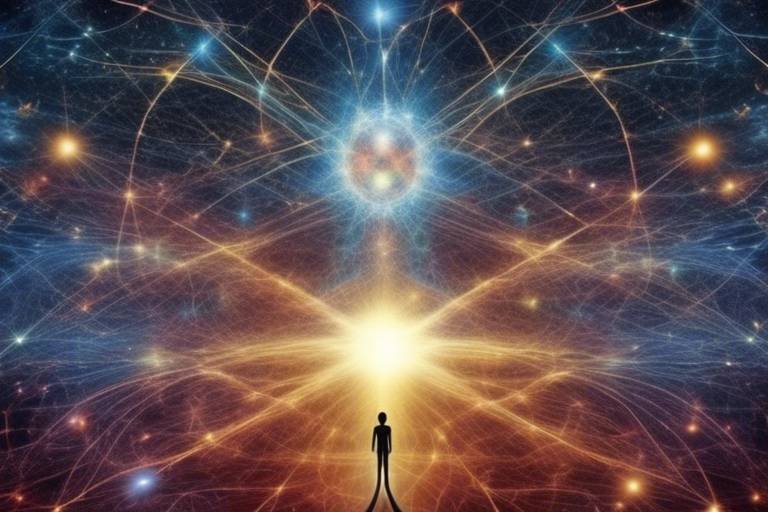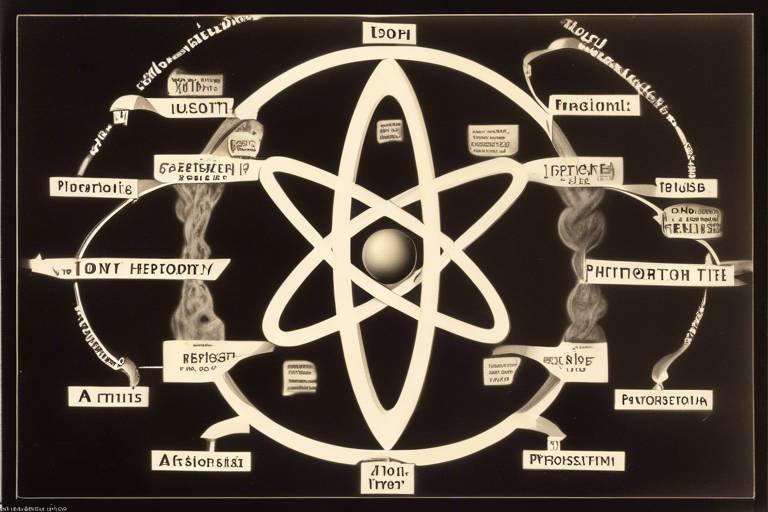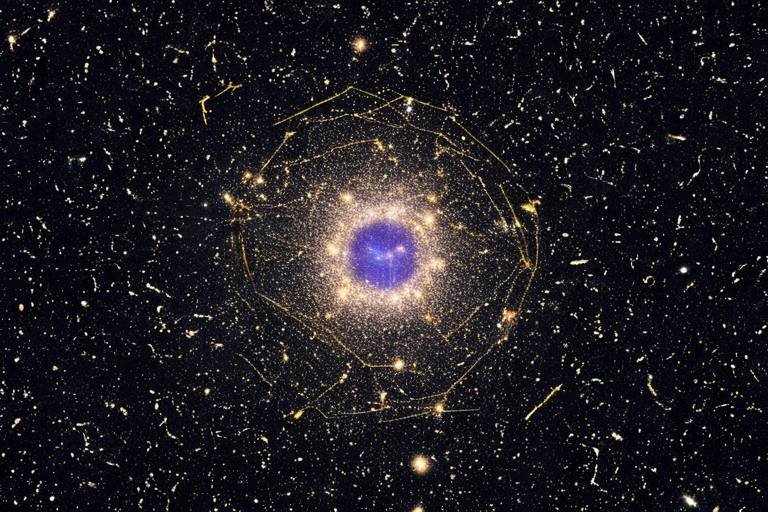Can Metaphysics Answer the Mysteries of Quantum Physics?
Have you ever found yourself staring at the stars, pondering the very fabric of reality? The interplay between metaphysics and quantum physics offers a fascinating lens through which to explore these cosmic mysteries. While quantum physics dives into the minuscule world of particles and their behaviors, metaphysics seeks to understand the fundamental nature of existence itself. So, can these two seemingly disparate fields come together to illuminate the unknown? In this article, we’ll embark on a journey to unravel the connections between these disciplines and see if metaphysical interpretations can indeed provide clarity to the perplexing phenomena observed in the quantum realm.
To grasp the relationship between metaphysics and quantum physics, we must first tackle the question: What is reality? This question has bewildered philosophers for centuries. In metaphysics, reality is often viewed as a complex tapestry woven from the threads of existence, consciousness, and perception. On the other hand, quantum physics introduces a reality that is anything but straightforward. Imagine a world where particles can exist in multiple states at once, and their behavior can be influenced by mere observation. This duality challenges our traditional understanding of what is real. Are we merely observers in a universe that exists independently, or do our perceptions shape the very fabric of reality itself? The intersection of these views invites us to rethink our assumptions and consider the profound implications of quantum mechanics.
One of the most mind-boggling aspects of quantum physics is quantum entanglement. This phenomenon occurs when two particles become intertwined in such a way that the state of one instantly influences the state of the other, regardless of the distance separating them. It’s as if they’re communicating through an invisible thread, defying the classical notion of separateness. Here’s where metaphysics steps in, providing a framework to interpret these connections. Could entangled particles suggest a deeper, underlying reality that transcends our conventional understanding of space and time? By exploring metaphysical interpretations, we can begin to unravel the implications of entanglement and its challenge to our perception of the universe.
The implications of quantum entanglement extend beyond the realm of physics into the heart of philosophical inquiry. If particles can influence one another instantaneously, what does this say about the nature of interconnectedness in our universe? Metaphysical theories propose that everything is fundamentally linked, presenting a vision of reality that is holistic rather than fragmented. This perspective invites us to consider profound questions: Are we all part of a vast cosmic web? How do our actions resonate beyond our immediate surroundings? By delving into these metaphysical concepts, we can better understand the interconnectedness that quantum entanglement suggests.
Non-locality, a key feature of quantum entanglement, challenges our classical views of space and time. In a world governed by relativity, information cannot travel faster than the speed of light. Yet, entangled particles seem to defy this rule, communicating across vast distances instantaneously. This paradox raises intriguing metaphysical questions: What if our understanding of time and space is fundamentally flawed? Could there be dimensions or realities beyond our perception? By employing metaphysical frameworks, we can explore these perplexities and perhaps find a more coherent understanding of the universe's structure.
Another captivating aspect of quantum mechanics is the role of the observer. In many interpretations of quantum theory, the act of observation appears to collapse a particle's wave function, determining its state. This raises the question: does consciousness play a crucial role in shaping reality? Some metaphysical perspectives suggest that our awareness is not merely a byproduct of existence but an integral component of the universe's fabric. This idea positions consciousness as a powerful force, capable of influencing quantum phenomena and, by extension, reality itself. As we navigate these waters, we must consider the implications of such a notion for our understanding of existence.
Various metaphysical interpretations of quantum mechanics, such as the Copenhagen interpretation and the many-worlds theory, provide distinct lenses through which to view quantum phenomena. The Copenhagen interpretation posits that physical systems do not have definite properties until measured, while the many-worlds theory suggests that every quantum event spawns a multitude of parallel realities. Each interpretation has its strengths and weaknesses, and examining these can deepen our understanding of the quantum world. It’s like peering through different windows into the same room—each perspective reveals unique aspects of the same reality.
The philosophy of science serves as a vital tool for analyzing the foundations of quantum physics. By scrutinizing the assumptions and implications of quantum theories, philosophical inquiry can illuminate the underlying principles that govern our understanding of the universe. This exploration often leads to a reevaluation of what we consider to be scientific knowledge. For instance, the debate between scientific realism and anti-realism has significant implications for interpreting quantum mechanics. Is the quantum world an objective reality, or is it merely a construct of our observations? These philosophical inquiries challenge us to rethink our approach to science and the nature of knowledge itself.
The debate between scientific realism and anti-realism is central to understanding how we interpret quantum mechanics. Scientific realists argue that the universe exists independently of our observations, while anti-realists contend that our knowledge of the universe is contingent upon our perceptions. This dichotomy raises profound metaphysical questions: What is the nature of reality, and how do we come to know it? By exploring these positions, we can gain insight into the philosophical implications of quantum theories and the extent to which they reflect an objective reality.
Hypotheses play a critical role in scientific inquiry, serving as the building blocks for understanding complex phenomena. In quantum theory, metaphysical assumptions often shape the formulation and interpretation of these hypotheses. For instance, the assumption of determinism versus indeterminism can lead to vastly different conclusions about the nature of quantum events. By examining how metaphysical perspectives influence the development of quantum hypotheses, we can better appreciate the intricate dance between science and philosophy.
- What is quantum entanglement? Quantum entanglement is a phenomenon where two particles become interconnected, such that the state of one instantly influences the state of the other, regardless of distance.
- How does metaphysics relate to quantum physics? Metaphysics explores fundamental questions about existence and reality, which can provide insights into the perplexing phenomena observed in quantum physics.
- What are the implications of the observer effect? The observer effect suggests that the act of observation can influence the behavior of quantum particles, raising questions about the role of consciousness in shaping reality.
- What are some metaphysical interpretations of quantum mechanics? Notable interpretations include the Copenhagen interpretation, which posits that particles do not have definite properties until measured, and the many-worlds theory, which suggests multiple parallel realities.

The Nature of Reality
Understanding the essence of reality is a complex endeavor that intertwines the realms of metaphysics and quantum physics. At its core, reality is often perceived as the sum of all things that exist, but what does that truly mean? Is reality merely a construct of our minds, or does it exist independently of our perception? These questions have puzzled thinkers for centuries and continue to ignite debates among scientists and philosophers alike.
In metaphysics, reality can be viewed through various lenses, including materialism, which posits that only physical substances exist, and idealism, which suggests that reality is fundamentally mental or immaterial. These contrasting perspectives lead to intriguing implications when we consider the findings of quantum physics, where particles can exist in multiple states simultaneously, challenging our conventional understanding of existence.
For instance, consider the concept of superposition in quantum mechanics, where a particle can be in multiple states at once until observed. This phenomenon raises the question: does reality change based on our observation? If so, does that imply that our consciousness plays a pivotal role in shaping the universe around us? This intertwining of perception and reality is a theme that resonates deeply in both metaphysical discourse and quantum physics.
Moreover, the exploration of reality leads us to consider the implications of quantum entanglement. When two particles become entangled, the state of one instantly influences the state of the other, regardless of the distance separating them. This challenges the traditional notion of separateness and prompts us to rethink our understanding of space and time. Are we merely isolated entities, or are we part of a grand interconnected tapestry? The philosophical ramifications of entanglement push us to reconsider the nature of reality itself.
To further illustrate these concepts, let's take a look at the following table, which summarizes different philosophical perspectives on reality:
| Philosophical Perspective | Description |
|---|---|
| Materialism | Reality consists only of physical matter; everything can be explained through physical laws. |
| Idealism | Reality is mentally constructed; the mind shapes the world around us. |
| Dualism | Both physical and non-physical (mental) substances exist and interact. |
| Phenomenalism | Objects only exist as sensory experiences; reality is dependent on perception. |
Ultimately, the nature of reality is a multifaceted puzzle, where metaphysics and quantum physics converge. As we delve deeper into these realms, we uncover not only the mechanics of the universe but also profound insights into our existence. Are we merely observers in a cosmic play, or do we hold the power to shape reality itself? This ongoing exploration invites us to ponder the very fabric of our universe.
- What is the relationship between metaphysics and quantum physics?
Metaphysics seeks to understand the fundamental nature of reality, while quantum physics explores the behavior of particles at a subatomic level. Together, they raise intriguing questions about existence and perception. - How does quantum entanglement challenge our understanding of reality?
Quantum entanglement suggests that particles can be interconnected regardless of distance, challenging the classical notion of separateness and prompting us to rethink our understanding of space and time. - Can consciousness influence quantum phenomena?
This is a debated topic; some interpretations of quantum mechanics suggest that the act of observation may affect the state of a particle, implying a connection between consciousness and reality.

Quantum Entanglement Explained
Quantum entanglement is one of the most fascinating and perplexing phenomena in the realm of quantum physics. It refers to a situation where two or more particles become linked, such that the state of one particle instantly influences the state of another, regardless of the distance separating them. Imagine having a pair of magic dice: no matter how far apart you roll them, if one shows a six, the other will too, instantly and without delay. This strange connection challenges our conventional understanding of separateness and locality, leading us to question the very fabric of reality itself.
At its core, entanglement suggests that particles can be interconnected in ways that classical physics simply cannot explain. When two particles are entangled, they share a quantum state, which means that their properties are correlated. For instance, if we measure the spin of one particle and find it to be "up," the other particle will be "down" if we measure it, no matter how far apart they are. This phenomenon raises profound questions about the nature of reality and the limits of our understanding. How can information travel faster than light? Is there a hidden connection that we have yet to discover? These questions are not just scientific; they delve deep into the realm of metaphysics and challenge our perceptions of existence.
To better understand quantum entanglement, let’s break down its implications. When we observe entangled particles, we enter a territory where traditional notions of cause and effect seem to dissolve. This leads us to consider the following points:
- Interconnectedness: The universe may be more interconnected than we perceive, suggesting a deep, underlying unity.
- Non-locality: Information seems to transcend space, challenging our classical views of how objects interact.
- Measurement Problem: The act of measurement plays a crucial role in determining the state of a quantum system, raising questions about the observer's influence.
The implications of quantum entanglement extend beyond physics into the philosophical domain. It invites us to reconsider our understanding of reality itself. Some metaphysical interpretations suggest that entangled particles might be manifestations of a single, unified entity, thus proposing that separation is merely an illusion. This perspective aligns with various philosophical traditions that emphasize the interconnectedness of all things. In this light, quantum entanglement could be viewed as a window into a more profound understanding of the universe, one where boundaries dissolve and everything is interwoven.
As we navigate through the complexities of quantum entanglement, it's essential to recognize that while science seeks to explain these phenomena, metaphysical interpretations can provide a broader context. They allow us to explore the philosophical ramifications of entanglement, encouraging us to ponder the nature of existence and our place within it. Whether we lean towards a more scientific or philosophical interpretation, the mysteries of quantum entanglement continue to fascinate and inspire inquiry into the very nature of reality.
- What is quantum entanglement? Quantum entanglement is a phenomenon where two or more particles become interconnected, such that the state of one particle instantaneously affects the state of another, regardless of the distance between them.
- How does entanglement challenge classical physics? It challenges the classical view of separateness and locality by suggesting that information can be shared instantaneously between entangled particles, defying the limitations of space and time.
- What are the philosophical implications of quantum entanglement? The phenomenon raises questions about interconnectedness, the nature of reality, and the role of the observer, prompting us to reconsider our understanding of existence and the universe.

Philosophical Implications of Entanglement
When we dive into the deep waters of quantum entanglement, we encounter a phenomenon that challenges our everyday understanding of reality and interconnectedness. Imagine two particles, seemingly light-years apart, yet instantaneously affecting each other's states. This peculiar behavior raises profound questions that ripple through both science and philosophy. What does it mean for us to consider something as 'separate' when the universe hints at an underlying unity? In this context, entanglement is not just a scientific curiosity; it serves as a philosophical conundrum that invites us to rethink our assumptions about the fabric of reality.
At the heart of these implications lies the concept of interconnectedness. Traditionally, we perceive the world through a lens of separateness—individual objects, distinct entities, and isolated events. However, quantum entanglement suggests that the universe may operate on a level where everything is interlinked. This notion can be quite unsettling. It prompts us to ask: if particles can influence each other across vast distances, what does that say about our own connections to one another and the universe at large?
Moreover, this interconnectedness challenges our understanding of causality. In classical physics, we tend to think of cause and effect as linear and local. However, entangled particles seem to defy this notion. The implications here are staggering; they suggest that our understanding of time and space might be far too simplistic. Could it be that our reality is woven together in a more intricate tapestry than we ever imagined? This leads to a fascinating philosophical discourse on the nature of reality itself.
Another significant philosophical implication of entanglement is the question of observer influence. In quantum mechanics, the act of observation appears to play a crucial role in determining the state of a system. This raises the intriguing possibility that consciousness itself could be a fundamental component of reality. Are we mere observers, or do we actively participate in shaping the universe? This question not only blurs the lines between subject and object but also invites us to explore the nature of consciousness and its relationship to the physical world.
In summary, the philosophical implications of quantum entanglement extend far beyond the realm of physics. They compel us to reconsider our views on interconnectedness, causality, and the role of the observer. As we grapple with these questions, we may find that the mysteries of quantum mechanics serve as a gateway to a deeper understanding of our place in the universe. In a way, entanglement is not just a scientific phenomenon; it’s a philosophical journey that invites us to explore the very essence of existence.
- What is quantum entanglement? Quantum entanglement is a phenomenon where two or more particles become linked, such that the state of one particle instantly influences the state of the other, regardless of the distance separating them.
- How does entanglement challenge traditional views of reality? Entanglement suggests that particles are not isolated entities but are instead interconnected, prompting a reevaluation of our understanding of separateness and causality.
- What role does the observer play in quantum mechanics? The observer's role is crucial; their measurement can influence the state of a quantum system, leading to philosophical questions about consciousness and reality.
- Can metaphysics provide insights into quantum physics? Yes, metaphysical interpretations can offer frameworks for understanding the implications of quantum phenomena, enriching our comprehension of both fields.

Non-locality and Its Challenges
Non-locality is one of the most fascinating and perplexing aspects of quantum physics. At its core, non-locality suggests that particles can be connected in ways that transcend traditional concepts of space and time. Imagine two entangled particles, separated by vast distances, yet instantly influencing each other's states. It's as if they are communicating through an invisible thread that defies the limitations of the physical world we know. This phenomenon challenges our understanding of reality and raises profound questions about the nature of existence itself.
To grasp the implications of non-locality, we must first understand its roots in quantum mechanics. The concept gained notoriety through experiments like the famous Bell's theorem, which demonstrated that the predictions of quantum mechanics could not be reconciled with classical intuitions about separateness. The results suggested that particles do not just exist in isolation; rather, they are part of a larger, interconnected fabric of reality. This realization is nothing short of revolutionary, as it prompts us to rethink everything we thought we knew about the universe.
However, non-locality also brings with it a host of challenges and questions. For instance, how do we reconcile this phenomenon with our everyday experiences, which are governed by local interactions? The classical view of the universe operates on the assumption that information cannot travel faster than the speed of light, yet non-locality seems to suggest otherwise. This contradiction forces us to confront the limitations of our current scientific paradigms and consider the potential need for a new framework of understanding.
Moreover, the implications of non-locality extend beyond physics into the realm of metaphysics. If particles can be entangled across vast distances, what does that say about the nature of space and time? Are they merely constructs of our perception, or do they have a more profound significance in the grand tapestry of the universe? These questions invite a deeper exploration of the interconnectedness of all things and challenge us to consider the possibility that our reality is far more complex than it appears.
In summary, non-locality is a captivating concept that not only challenges our scientific understanding but also invites us to ponder the metaphysical implications of an interconnected universe. As we delve deeper into the mysteries of quantum physics, we may find that the answers lie not just in equations and experiments, but in a broader philosophical inquiry that seeks to uncover the very essence of reality itself.
- What is non-locality in quantum physics? Non-locality refers to the phenomenon where particles can instantaneously affect each other's states regardless of the distance separating them, defying classical notions of separateness.
- How does non-locality challenge classical physics? Non-locality contradicts the classical view that information cannot travel faster than the speed of light, prompting a reevaluation of our understanding of space and time.
- What are the philosophical implications of non-locality? Non-locality raises questions about the interconnectedness of all things and challenges our perceptions of reality, suggesting that space and time may be constructs rather than fundamental aspects of existence.

Consciousness and Observation
When we dive into the realm of quantum mechanics, we stumble upon a fascinating conundrum: the role of the observer. Imagine for a moment that you're peering into a dark room. Without any light, you can only guess what's inside. Now, flip the switch, and suddenly, the darkness dissipates, revealing all the details. This simple analogy reflects the essence of how observation interacts with quantum phenomena. In quantum physics, the act of observing a particle doesn't just reveal its state; it seems to influence it as well. This raises profound questions about the nature of reality itself and how consciousness fits into the equation.
One of the most intriguing aspects of this relationship is the concept of wave function collapse. In layman's terms, particles exist in a state of probability until they are observed, at which point they 'choose' a specific state. This notion implies that consciousness plays a pivotal role in determining the outcome of quantum events. But what does this mean for our understanding of reality? Are we mere spectators in a cosmic play, or do we actively shape the narrative?
Philosophers and physicists alike have grappled with these questions, leading to various interpretations of quantum mechanics. For instance, the Copenhagen interpretation suggests that the act of measurement affects the system being observed. On the other hand, the many-worlds interpretation posits that all possible outcomes occur in parallel universes, each branching off at the moment of observation. Both interpretations challenge our conventional understanding of reality and compel us to reconsider the significance of consciousness.
To better illustrate this complex relationship, let's consider a few key points:
- Observer Effect: The phenomenon where the act of observation alters the state of a quantum system.
- Consciousness as a Catalyst: Some theories propose that consciousness is essential for the collapse of the wave function.
- Reality as a Construct: The interplay between observation and reality suggests that our perception may actively shape the universe around us.
As we navigate through these ideas, it's crucial to recognize that the implications of consciousness in quantum mechanics extend beyond the laboratory. They touch on fundamental philosophical questions about existence, perception, and the nature of reality itself. Are we merely passive observers, or do we possess the ability to influence the very fabric of the universe? These inquiries not only push the boundaries of science but also invite us to explore the depths of our own consciousness.
In conclusion, the relationship between consciousness and observation in quantum physics is a rich tapestry of ideas that intertwines science and philosophy. As we continue to unravel the mysteries of the quantum world, one thing becomes clear: understanding the role of the observer is essential for grasping the deeper truths about our universe and ourselves.
- What is the observer effect in quantum mechanics? The observer effect refers to changes that the act of observation can make on a quantum system, particularly when measuring the properties of particles.
- How does consciousness influence quantum phenomena? Some interpretations suggest that consciousness plays a crucial role in determining the outcomes of quantum events, leading to the collapse of the wave function.
- What are the implications of quantum mechanics for our understanding of reality? Quantum mechanics challenges our traditional views of reality, suggesting that observation may shape the universe and that multiple outcomes can exist simultaneously.

Metaphysical Interpretations of Quantum Mechanics
When diving into the world of quantum mechanics, it becomes clear that the mathematical formalism alone cannot fully encapsulate the bizarre behavior of particles at the quantum level. This is where metaphysical interpretations come into play, offering various lenses through which to understand these phenomena. Two of the most prominent interpretations are the Copenhagen interpretation and the many-worlds theory. Each comes with its own set of assumptions and implications, shaping our understanding of reality itself.
The Copenhagen interpretation, proposed by physicists like Niels Bohr and Werner Heisenberg, suggests that quantum particles do not have definite properties until they are measured. This idea can be quite jarring; it implies that reality is not fixed but rather influenced by observation. Imagine a world where your mere act of looking at a cat determines whether it is alive or dead—this thought experiment, famously known as Schrödinger's cat, illustrates the strangeness of this interpretation. In this view, the act of measurement collapses the wave function, leading to a single outcome from a multitude of possibilities.
On the other hand, the many-worlds theory, introduced by Hugh Everett III, posits that all possible outcomes of quantum measurements actually occur, but in separate, branching universes. Think of it as a cosmic tree, where every decision or measurement creates a new branch, leading to countless realities existing simultaneously. This interpretation challenges our conventional understanding of time and space, suggesting that every choice creates a new universe. While this theory elegantly avoids the measurement problem posed by the Copenhagen interpretation, it raises its own metaphysical questions about the nature of existence and what it means to be “real.”
Both interpretations highlight a fundamental aspect of quantum mechanics: the role of the observer. This leads us to consider the implications of consciousness in the quantum realm. Does the act of observation create reality, or is reality independent of our awareness? These questions are not just scientific; they delve deep into philosophical territory, inviting us to examine our assumptions about the universe.
In addition to these interpretations, there are other metaphysical perspectives worth mentioning, such as pilot-wave theory and objective collapse theories. Each of these frameworks attempts to address the peculiarities of quantum mechanics from different angles, contributing to an ongoing conversation about the nature of reality. The pilot-wave theory, for example, introduces the idea of a guiding wave that dictates the behavior of particles, while objective collapse theories suggest that wave functions collapse spontaneously, independent of observation.
Ultimately, the exploration of metaphysical interpretations of quantum mechanics serves as a reminder of the limitations of our current understanding. As we grapple with the implications of quantum phenomena, we are left with more questions than answers, pushing the boundaries of both science and philosophy. So, whether you resonate more with the idea of a single reality influenced by observation or a multiverse where every possibility exists, one thing is clear: the intersection of metaphysics and quantum physics is a rich field of inquiry that continues to captivate the curious minds of scientists and philosophers alike.
- What is the Copenhagen interpretation? The Copenhagen interpretation suggests that quantum particles do not have definite properties until they are measured, leading to a collapse of the wave function upon observation.
- What is the many-worlds theory? The many-worlds theory posits that all possible outcomes of quantum measurements occur in separate, branching universes, creating a vast multiverse.
- How does consciousness affect quantum mechanics? The role of the observer raises questions about whether consciousness influences quantum phenomena or if reality exists independently of observation.
- Are there other metaphysical interpretations? Yes, interpretations like pilot-wave theory and objective collapse theories offer alternative views on the nature of quantum mechanics.

Philosophy of Science and Quantum Physics
When we dive into the intricate world of quantum physics, we often find ourselves grappling with questions that transcend mere scientific inquiry. The philosophy of science acts as a guiding light, illuminating the path through which we can better understand the underlying principles of quantum mechanics. This intersection of philosophy and science is not just an academic exercise; it's a profound exploration of what it means to know, to observe, and to exist in a universe governed by rules that often defy our intuitive grasp.
At the heart of this exploration lies a fundamental question: What is the nature of scientific knowledge? In quantum physics, we encounter concepts that challenge our traditional understanding of reality, such as superposition and entanglement. These phenomena compel us to reconsider the very foundations of our scientific frameworks. The philosophy of science provides us with the tools to analyze these concepts critically, asking whether our scientific theories reflect an objective reality or merely serve as useful models for predicting outcomes.
One of the essential debates within the philosophy of science is the tension between scientific realism and anti-realism. Scientific realists argue that the entities and processes described by our best scientific theories—like particles and waves in quantum mechanics—exist independently of our observations. In contrast, anti-realists maintain that these theories are mere constructs, useful for making predictions but not necessarily reflective of an objective reality. This debate is crucial for interpreting quantum mechanics because it influences how we approach the interpretations of quantum theory.
Consider the implications of these philosophical positions on our understanding of quantum phenomena. For instance, if we lean towards scientific realism, we might conclude that entangled particles are indeed interconnected, regardless of the distance separating them. Alternatively, an anti-realist perspective might suggest that such connections are merely a byproduct of our theoretical framework, not indicative of a deeper reality. This divergence in thought highlights the importance of philosophical inquiry in shaping our interpretations of quantum physics.
Moreover, the role of hypotheses in quantum theory cannot be overstated. Hypotheses are the building blocks of scientific exploration, guiding researchers in their quest for understanding. However, the metaphysical assumptions underlying these hypotheses can significantly influence their formulation and interpretation. For example, the assumption that particles have definite properties before measurement is a contentious point that has led to various interpretations of quantum mechanics.
To further illustrate this, let's take a look at a simple table summarizing some key philosophical positions related to quantum physics:
| Philosophical Position | Description |
|---|---|
| Scientific Realism | Belief that scientific theories describe an objective reality. |
| Anti-realism | View that scientific theories are useful fictions, not necessarily true. |
| Instrumentalism | Theories are tools for predicting observations, not descriptions of reality. |
| Constructive Empiricism | Acceptance of theories based on their empirical adequacy rather than truth. |
This table highlights how different philosophical perspectives can shape our understanding of quantum physics. By critically engaging with these ideas, we can develop a more nuanced appreciation of the complex interplay between philosophy and science.
In conclusion, the philosophy of science is not merely an abstract discipline; it is essential for navigating the perplexing waters of quantum physics. As we continue to unravel the mysteries of the quantum realm, philosophical inquiry will play a vital role in shaping our interpretations and understanding of the universe. So, the next time you ponder the peculiarities of quantum mechanics, remember that philosophy is not far behind, ready to help us make sense of the seemingly nonsensical.
- What is the philosophy of science? - It is the study of the assumptions, foundations, and implications of science.
- How does philosophy relate to quantum physics? - Philosophy provides frameworks for understanding and interpreting the principles and implications of quantum mechanics.
- What are some key debates in the philosophy of science? - Key debates include scientific realism vs. anti-realism, and the role of hypotheses in scientific inquiry.

Scientific Realism vs. Anti-realism
When diving into the fascinating world of quantum physics, one of the most compelling debates is that between scientific realism and anti-realism. At its core, this discussion revolves around the nature of scientific theories and what they tell us about the world. Scientific realism posits that the universe described by science is indeed how it exists independently of our observations. In other words, it suggests that the entities and phenomena described by scientific theories are real, even if we can't see or measure them directly. Think of it as believing that the stars you see in the night sky exist, regardless of whether you're peering through a telescope or not.
On the flip side, anti-realism takes a more skeptical view. It argues that scientific theories are merely useful instruments for predicting observable phenomena rather than accurate descriptions of an objective reality. In this view, the focus shifts from what is "real" to what can be empirically verified. It's akin to saying that a map is not the territory; it’s a representation that helps us navigate but doesn't capture the entirety of the landscape. This raises a crucial question: if quantum mechanics is true, does that mean the strange behaviors it describes—like particles being in multiple places at once—are real, or are they just mathematical tools that help us make predictions?
To better understand these positions, let’s break down some key distinctions:
| Aspect | Scientific Realism | Anti-realism |
|---|---|---|
| Nature of Scientific Theories | Describes an objective reality | Tools for prediction |
| Existence of Unobservable Entities | They exist and are real | They are not necessarily real |
| Focus | Truth of theories | Utility of theories |
This debate is particularly relevant in quantum physics, where phenomena like quantum superposition and entanglement challenge our conventional understanding of reality. Proponents of scientific realism might argue that the bizarre behavior of particles is evidence of a deeper, underlying reality that we are just beginning to understand. Meanwhile, anti-realists might contend that our interpretations of quantum mechanics are just useful fictions that help us make sense of the data we observe without making claims about the existence of unobservable entities.
Ultimately, this clash of perspectives leads us to ponder profound questions about the nature of existence and our place within it. Are we merely observers in a grand cosmic play, or do our observations shape the very fabric of reality? As we further explore the intersection of metaphysics and quantum physics, these inquiries only deepen, inviting us to reconsider our assumptions and beliefs about the universe.
- What is scientific realism? Scientific realism is the view that scientific theories describe an objective reality that exists independently of our observations.
- What is anti-realism? Anti-realism posits that scientific theories are merely instruments for predicting observable phenomena, rather than accurate descriptions of reality.
- How does this debate relate to quantum physics? The debate is pertinent in quantum physics due to the strange behaviors observed, which challenge our conventional understanding of reality.
- Can both views coexist? While they often seem contradictory, some philosophers argue for a nuanced view that incorporates elements of both realism and anti-realism.

The Role of Hypotheses in Quantum Theory
When we dive into the intricate world of quantum theory, one thing becomes abundantly clear: hypotheses are the lifeblood of scientific exploration. They serve as the foundational building blocks that guide researchers in their quest to unravel the mysteries of the quantum realm. But what exactly is a hypothesis in this context? Simply put, it’s a proposed explanation for a phenomenon, one that can be tested and validated through experimentation. In quantum physics, where the rules seem to bend and twist in ways that defy our classical understanding, the role of hypotheses becomes even more critical.
Consider this: without a structured hypothesis, scientists would be like sailors lost at sea, without a compass to guide them. Hypotheses allow physicists to formulate predictions about the behavior of particles under various conditions. For instance, the famous double-slit experiment, which demonstrates the wave-particle duality of light, hinged on hypotheses regarding how light behaves when observed and unobserved. The outcomes of such experiments not only test these hypotheses but also challenge our very understanding of reality.
Moreover, hypotheses in quantum theory often emerge from metaphysical assumptions about the nature of reality itself. For example, the Copenhagen interpretation posits that particles exist in a state of probability until observed, raising questions about the role of the observer. This leads us to a fascinating intersection where science and philosophy collide. The implications of these hypotheses can be profound, shaping not only our understanding of quantum mechanics but also our broader philosophical outlook on existence.
As we analyze the role of hypotheses, it’s essential to recognize that they are not static; they evolve as new data emerges. This adaptability is crucial in quantum physics, where experimental results can often contradict established theories. For instance, the emergence of quantum entanglement challenged previous hypotheses about the independence of distant particles, prompting scientists to rethink their models and assumptions. Such situations illustrate the dynamic nature of scientific inquiry, where hypotheses are continuously refined, replaced, or even discarded in light of new evidence.
To further illustrate the importance of hypotheses in quantum theory, let’s take a look at a simple table summarizing different interpretations and their corresponding hypotheses:
| Interpretation | Key Hypothesis | Implications |
|---|---|---|
| Copenhagen Interpretation | Particles exist in a superposition of states until measured. | Reality is probabilistic, not deterministic. |
| Many-Worlds Interpretation | All possible outcomes of quantum measurements are realized in separate, branching universes. | Every decision creates a new universe, leading to infinite realities. |
| Pilot-Wave Theory | Particles have definite positions guided by a wave function. | Restores determinism to quantum mechanics. |
This table highlights how different interpretations of quantum mechanics arise from distinct hypotheses, each with unique implications for our understanding of the universe. Ultimately, these hypotheses are not just theoretical musings; they are essential tools that allow scientists to navigate the complexities of quantum phenomena.
In conclusion, the role of hypotheses in quantum theory is multifaceted and dynamic. They guide experimental design, challenge existing paradigms, and invite philosophical reflection. As we continue to explore the quantum landscape, the interplay between hypotheses and experimental data will undoubtedly lead to new discoveries and deeper insights into the nature of reality itself.
- What is a hypothesis in quantum physics? A hypothesis in quantum physics is a proposed explanation for a phenomenon that can be tested through experiments.
- Why are hypotheses important in quantum theory? Hypotheses are crucial because they provide a framework for making predictions and guiding experiments in the complex world of quantum mechanics.
- How do hypotheses evolve in quantum physics? Hypotheses evolve as new experimental data is collected, leading to refinements or rejections of previous theories.
- Can metaphysical assumptions influence scientific hypotheses? Yes, metaphysical assumptions about reality can shape the hypotheses that scientists propose in quantum theory.
Frequently Asked Questions
- What is the relationship between metaphysics and quantum physics?
Metaphysics and quantum physics intersect in their exploration of reality's nature. While quantum physics provides empirical observations of the universe, metaphysics delves into the philosophical implications of these findings. Together, they attempt to unravel the mysteries of existence and the fundamental laws governing the cosmos.
- How does quantum entanglement challenge traditional views?
Quantum entanglement defies conventional ideas about separateness and locality. When particles become entangled, the state of one particle instantly influences the state of another, regardless of the distance between them. This phenomenon raises profound questions about the interconnectedness of reality and suggests that our understanding of space and time may need to be re-evaluated.
- What are the philosophical implications of quantum entanglement?
The implications of quantum entanglement extend beyond physics into the realm of philosophy. It challenges our perceptions of individuality and separateness, inviting us to reconsider the nature of relationships and interconnectedness in the universe. Philosophers ponder whether entanglement suggests a deeper unity underlying the apparent diversity of the physical world.
- What is non-locality in quantum physics?
Non-locality refers to the phenomenon where particles can instantaneously affect each other’s states, regardless of the distance separating them. This concept contradicts classical physics, which relies on local interactions. Metaphysical frameworks can provide insights into the implications of non-locality, suggesting that our understanding of space and time may be fundamentally flawed.
- How does consciousness influence quantum phenomena?
The role of the observer in quantum mechanics has led to intriguing discussions about consciousness's impact on reality. Some interpretations suggest that consciousness may play a crucial role in determining the outcomes of quantum events. This raises questions about the nature of reality and the extent to which our awareness shapes the world around us.
- What are the major metaphysical interpretations of quantum mechanics?
Several interpretations exist, including the Copenhagen interpretation, which posits that quantum particles do not have definite states until observed, and the many-worlds theory, which suggests that all possible outcomes occur in separate, branching universes. Each interpretation offers unique perspectives on the nature of reality and the implications of quantum mechanics.
- What is the philosophy of science in relation to quantum physics?
The philosophy of science examines the assumptions, foundations, and implications of scientific theories, including quantum physics. It provides tools for analyzing the validity of quantum theories and encourages critical thinking about how we understand scientific knowledge and its limitations.
- What is the debate between scientific realism and anti-realism?
This debate centers on whether scientific theories accurately describe reality. Scientific realism posits that theories reflect the true nature of the world, while anti-realism argues that theories are merely useful instruments for predicting observations. This discussion has significant implications for interpreting quantum mechanics and understanding its philosophical underpinnings.
- How do metaphysical assumptions shape quantum hypotheses?
Metaphysical assumptions influence the formulation and interpretation of quantum hypotheses by framing the questions scientists ask and the models they create. These assumptions can dictate whether researchers view quantum phenomena as fundamentally probabilistic or deterministic, ultimately shaping our understanding of the quantum realm.



















